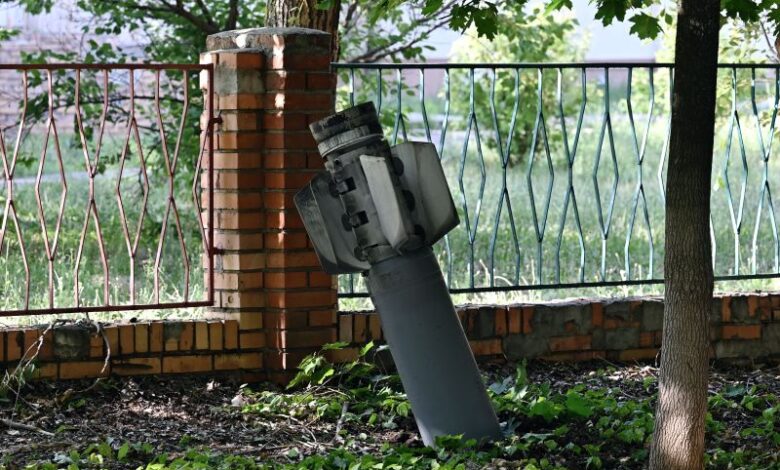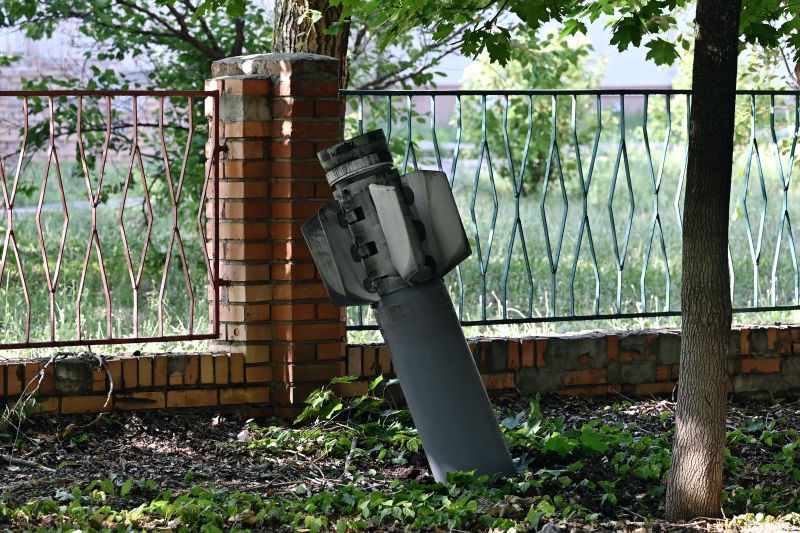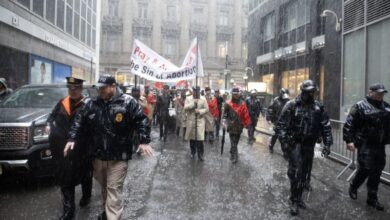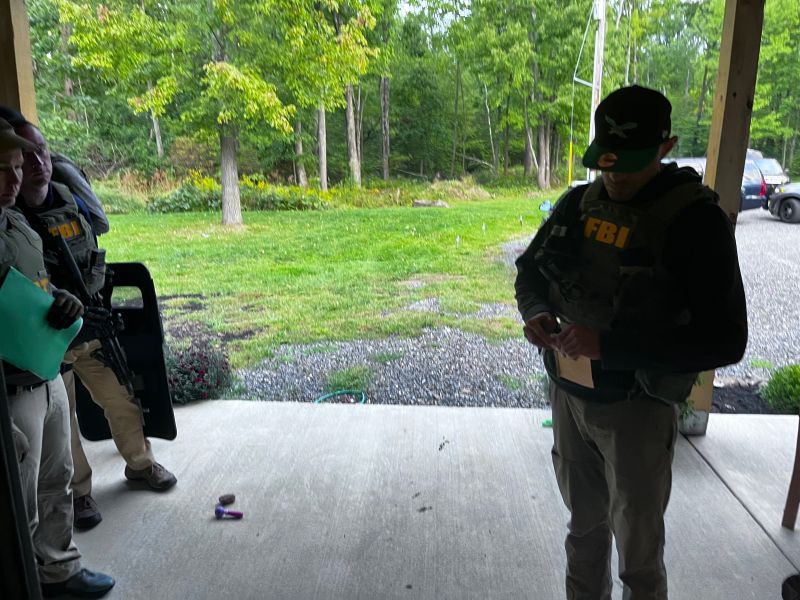Biden administration to send cluster bombs to Ukraine: What has the Church said?

 A photograph taken on July 3, 2022 shows an tail section of a 300mm rocket which appear to contained cluster bombs launched from a BM-30 Smerch multiple rocket launcher embedded in the ground after shelling in Kramatorsk, amid the Russian invasion of Ukraine. / Getty Images
A photograph taken on July 3, 2022 shows an tail section of a 300mm rocket which appear to contained cluster bombs launched from a BM-30 Smerch multiple rocket launcher embedded in the ground after shelling in Kramatorsk, amid the Russian invasion of Ukraine. / Getty Images Washington D.C., Jul 7, 2023 / 14:53 pm (CNA).
The Biden administration announced Friday that it would be sending possibly hundreds of thousands of highly controversial “cluster bombs” to aid in Ukraine’s counter-offensive against Russia. The bombs which instantaneously drop dozens to hundreds of explosives over a large area, are banned by 123 countries including the Holy See.
U.S. Undersecretary of Defense for Policy Colin Kahl confirmed in a press briefing Friday that the U.S. would be sending the bombs as part of its new $ 800 million weapons aid package to Ukraine.
What are ‘cluster munitions’?
Cluster bombs are mass casualty arms that present an especially grave threat to civilians both because of their indiscriminately large impact area and because they have a significant failure rate, often not exploding until long after impact.
Air Force Brigadier General Pat Ryder told reporters Thursday that the U.S. would be “carefully selecting” cluster bombs with failure rates under 2.35% to send to Ukraine.
Current U.S. law prohibits the production, use, or transfer of cluster munitions with failure rates over 1%, however, that law can be overridden by the president if he deems it vital to U.S. national security, according to The Washington Post.
Though 123 countries have agreed to terms set by the 2008 “Convention on Cluster Munitions,” which explicitly bans the use, transfer, production, and stockpiling of cluster bombs, the U.S., China, Russia, and Ukraine have never signed onto the agreement, and are not bound by it.
Nonetheless, key U.S. allies, such as the U.K., France, and Germany have all banned their use, exerting political pressure on the U.S. NATO has also been extremely critical of Russia’s use of cluster bombs in their invasion of Ukraine.
What has the Catholic Church said?
For its part, the Catholic Church has long condemned the use of cluster munitions.
In 2008, when the Convention on Cluster Munitions was first being discussed, Pope Benedict XVI was a resolute backer of the ban.
The Holy See was among the first nations to ratify, sign, and call on other nations to agree to the convention.
CNA shared a 2008 Vatican press release that said: “The Holy See considers the Convention on cluster munitions an important step in the protection of civilians during and after conflicts, from the indiscriminate effects of this inhumane type of weapon.”
Then Vatican Secretary for Relations with States Archbishop Dominique Mamberti, now a cardinal and head of the Apostolic Signatura, stated that the Holy See took the unusual step of immediately ratifying the treaty to “send out a powerful political signal” of support to victims and “to launch an appeal to States — especially to the producers, exporters and potential consumers of cluster munitions — to join the current signatories.”
Benedict called the ban “necessary” to “heal the errors of the past and avoid them happening again in the future.”
“I pray for the victims of the cluster munitions, for their families, and for those who join in this conference too, wishing that it will be successful,” Benedict said. “I hope that, thanks to the responsibility of all participants, we can reach an international instrument that is strong and credible: it is indeed necessary to remedy past mistakes and prevent recurrence in the future.”
In 2017, Archbishop Ivan Jurkovič, then the Vatican’s Permanent Observer to the United Nations in Geneva, called for the “universalization and full implementation” of the cluster bomb ban, “making sure that, in the future, the cluster munitions will never be a cause of human suffering.”
“Now, even more than when the CCM was adopted, it is imperative to uphold our moral responsibility to defend the dignity of the victims and to restate the prohibitions under the Convention through a humanitarian lens,” Jurkovič said. “Global adherence to the CCM, and upholding its standards, will contribute to the achievement of sustainable and integral human development.”
In a 2017 address calling for nuclear disarmament, Pope Francis praised the ban on cluster bombs, pointing to it as an indicator that the international community can and should ban nuclear weapons as well.
How has the world reacted?
NATO has taken an ambivalent stance on the U.S.’s controversial decision to supply cluster munitions to Ukraine.
On Friday NATO Secretary General Hens Stoltenberg said that “NATO as an Alliance does not have a position on the Convention on Cluster Munitions, because a number of Allies have signed the convention, but a number of Allies have not signed the convention.”
Stoltenberg added that “it is for individual Allies to make decisions on the delivery of weapons and military supplies to Ukraine.”
In the U.S., Biden’s decision has faced considerable criticism from multiple Democratic members of Congress.
“A victory for Ukraine is an essential victory for democracies across the globe, but that victory cannot come at the expense of our American values and thus democracy itself,” said Democratic Rep. Chrissy Houlahan of Pennsylvania on Friday.
“I challenge the notion that we should employ the same tactics Russia is using,” Houlahan said on Twitter. “And I challenge all of us to remember that this war will end, and the broken pieces of Ukraine will need to be rebuilt. History remembers not only who wins a war but also how a war is won.”
In a Friday statement, Democratic Rep. Jim McGovern, a Catholic from Massachusetts, called cluster bombs “indiscriminate weapons that disperse hundreds of bomblets which can travel far beyond military targets and injure, maim, and kill civilians — often long after a conflict is over.”
“I continue to strongly support helping Ukraine stand up to Russia’s brutal war of aggression. But cluster munitions won’t help,” McGovern said. “I universally oppose the use of these internationally banned weapons. I urge President Biden to listen to our NATO allies, such as the United Kingdom, France, Germany, and Spain, who suppose sending cluster munitions to Ukraine for the same reasons.”
I continue to strongly support helping Ukraine stand up to Russia’s brutal war of aggression. But cluster munitions won’t help.
My full statement ⬇️ pic.twitter.com/lmn0QH9Ug6
— Rep. Jim McGovern (@RepMcGovern) July 7, 2023
When questioned further about the decision on Friday, National Security Advisor Jake Sullivan told reporters that the U.S. “consulted closely with allies in deciding to do this.”
Sullivan said that “even allies who were signatories to the Oslo Convention [on Cluster Munitions]” have “indicated both privately and many of them publicly over the course of today that they understand our decision and fundamentally that they recognize the difference between Russia using its cluster munitions to attack Ukraine and Ukraine using its cluster munitions to defend itself, its citizens, and its sovereign territory.”
The United States Conference of Catholic Bishops and Archdiocese for the Military Services were unable to comment on the matter at the time of publication.



